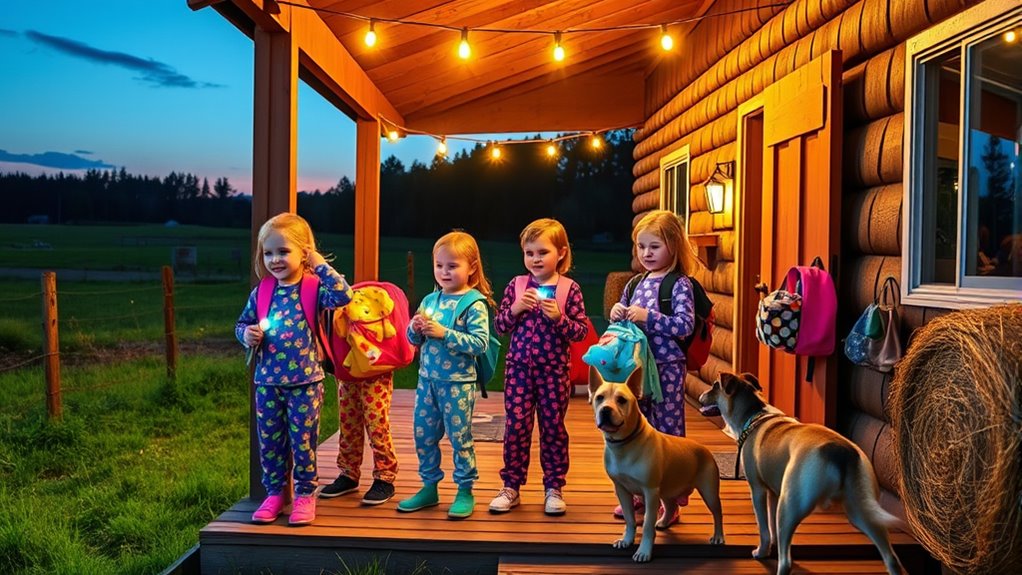To prepare your child for an overnight farm camp, focus on packing essentials like sturdy shoes, sun protection, and a comfort item. Teach safety rules, proper animal handling, and emergency procedures to boost confidence. Help them understand farm routines and encourage independence through simple responsibilities. Address emotional concerns with reassurance and stress coping strategies. By setting these foundations, you’ll help your child feel safe and excited—there’s more to explore to guarantee they’re fully prepared for a fun, memorable experience.
Key Takeaways
- Teach safety rules, proper gear use, and animal interaction to promote confidence and prevent accidents.
- Practice emergency procedures, weather preparedness, and communication plans to ensure safety during overnight stays.
- Encourage emotional readiness by discussing feelings, normalizing homesickness, and teaching coping strategies.
- Foster independence through age-appropriate chores, responsibility, and problem-solving activities.
- Involve children in packing, planning, and role-playing to build confidence and ownership of camp experience.
Packing Essentials for a Safe and Comfortable Stay

Packing the right essentials can make all the difference in guaranteeing your child’s overnight farm camp experience is safe and comfortable. Include sturdy, closed-toe shoes for farm chores, where kids might handle animals or help with planting. A hat and sunscreen are essential for sun protection during outdoor activities. Don’t forget a lightweight, long-sleeved shirt and pants to prevent scrapes and insect bites. For bedtime routines, pack a favorite blanket or stuffed animal to help your child feel secure. A sleepwear set suitable for the weather ensures comfort through the night. A refillable water bottle and snacks will keep energy levels up after busy farm chores. Planning these essentials helps your child settle in easily, stay safe, and enjoy every moment of their farm camp adventure. Additionally, understanding electric dirt bike horsepower can be useful if your child is interested in outdoor recreational activities during their stay.
Discussing Farm Safety Rules and Expectations
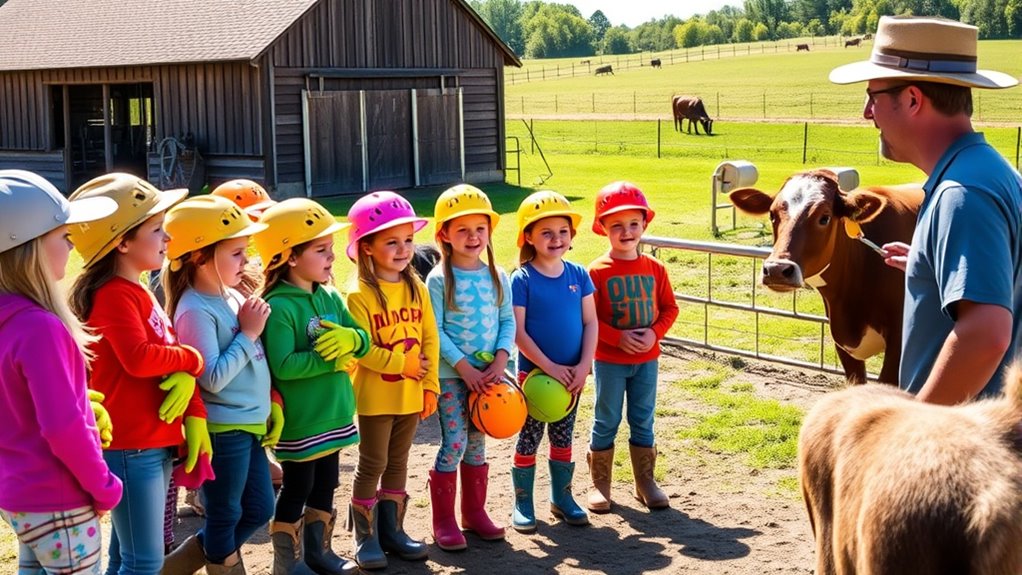
Make sure your kids understand the importance of wearing farm safety gear like boots and gloves at all times. Explain how to interact with animals safely and what to do in emergency situations. Clear rules help your children stay safe and enjoy their farm camp experience. Additionally, discussing animal safety can help prevent accidents and ensure a positive experience for everyone.
Farm Safety Gear
Wearing the right safety gear is essential to keep kids safe during overnight farm camps. Proper farm footwear protects their feet from sharp objects, uneven terrain, and heavy equipment. Sturdy boots with good traction prevent slips and injuries, ensuring kids stay stable while exploring. Safety vests are also crucial; they make children more visible to others, especially in busy or low-light conditions. Encourage kids to always wear their safety vests when moving around the farm, especially near machinery or working animals. Remind them that safety gear isn’t just for adults — it’s a vital part of their safety plan. By consistently using farm footwear and safety vests, kids learn to prioritize safety and build good habits that last beyond camp. Regular use of appropriate gear can also reduce the risk of injuries related to collagen production and skin elasticity issues.
Animal Interaction Guidelines
Because animals on the farm can be unpredictable, it’s essential to follow clear safety rules when interacting with them. Always ask for permission before approaching animals and stick to designated areas where animal contact is allowed. Keep your movements calm and gentle to avoid startling them. Follow feeding protocols carefully—only feed animals when instructed, and use appropriate food provided by the farm. Never feed animals outside designated times or with inappropriate items, as this can cause health issues or aggressive behavior. Remember to wash your hands afterward to prevent the spread of germs. Respect animals’ space and watch for signs of discomfort or agitation. Staying attentive and following these guidelines keeps everyone safe and helps foster a positive, respectful relationship with the farm animals.
Emergency Procedures
Understanding how to respond in an emergency is vital to keeping everyone safe during farm overnight camps. You should know the farm’s safety rules, including fire safety protocols, such as knowing how to use fire extinguishers and evacuate quickly if needed. Weather preparedness is also essential; always stay informed about weather forecasts and follow guidelines for storms or extreme heat. Kids need clear instructions on what to do if they see a fire or if severe weather hits. Make sure they know where safe zones are and how to alert staff. Practicing these procedures beforehand helps everyone stay calm and act quickly. Being familiar with emergency procedures and the importance of safety protocols can significantly reduce risks and enhance overall safety. By understanding emergency procedures, you guarantee a safer, more enjoyable camp experience.
Preparing Your Child Mentally and Emotionally

Preparing your child mentally and emotionally for overnight farm camps is essential to help them feel confident and secure. Encourage open conversations about their feelings and listen actively to address any worries. Teach stress management techniques, such as deep breathing or positive visualization, so they can handle homesickness or unfamiliar situations calmly. Building their social skills is equally important; role-play group activities or sharing stories to boost their confidence in making friends. Remind them that feeling a little nervous is normal, and reassure them that you believe in their ability to adapt. Preparing them emotionally helps foster resilience and independence, making their camp experience more enjoyable and less stressful. Your support will set the foundation for a positive, memorable adventure.
Introducing Farm Animals and Equipment
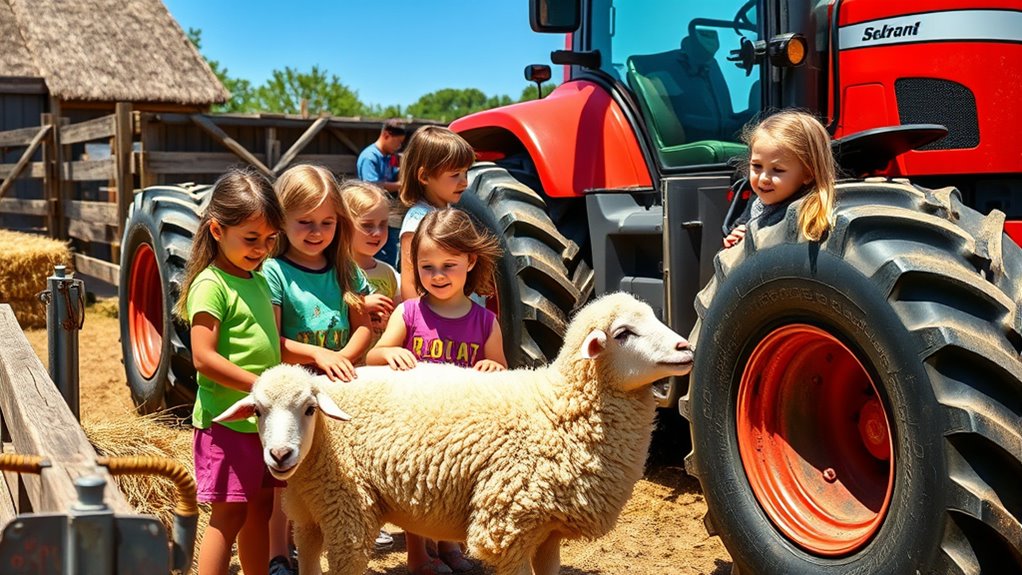
Familiarizing your child with the farm animals and equipment before camp helps build their confidence and reduces surprises. Spend time explaining farm animal behaviors, like how cows might moo loudly or chickens peck at the ground. Demonstrate safe approaches and respectful interactions so they understand animal cues. Additionally, introduce essential equipment and basic maintenance techniques, such as how to clean tools or check fences for safety. Showing your child how equipment works and the importance of upkeep helps them feel more comfortable and responsible. This preparation encourages curiosity and reduces anxiety about unfamiliar sights and sounds. Understanding pinball machine weights and how equipment functions on a farm can also help children grasp the importance of proper handling and safety. By understanding animal behaviors and equipment maintenance, your child gains practical knowledge that boosts their confidence and ensures a safe, enjoyable farm camp experience.
Establishing Communication Plans and Emergency Contacts
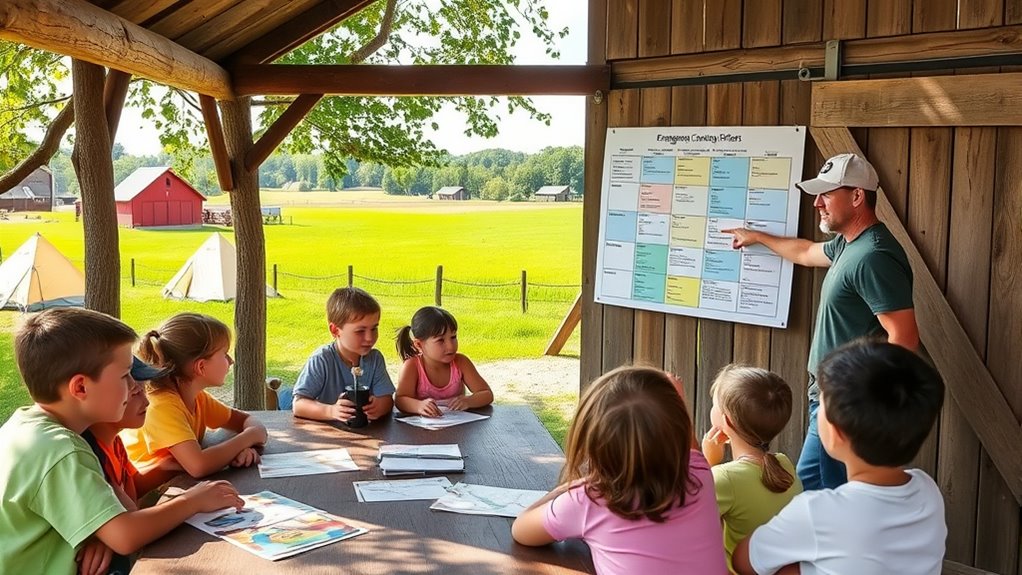
After introducing your child to the farm animals and equipment, it’s important to set up clear communication plans and emergency contacts. Talk with camp staff to understand their communication strategies and how they’ll keep you informed if any issues arise. Make sure your emergency contact updates are accurate and complete, including multiple contacts if possible. Share your preferred method of contact, whether phone calls, texts, or emails, and confirm how quickly they’ll respond. Establish a designated check-in time each day and discuss what your child should do if they need help. Having a solid plan in place ensures you stay connected and ready for any situation, giving you peace of mind during your child’s farm camp experience. Additionally, understanding the camp’s communication protocols can help you better interpret their updates and respond appropriately when needed.
Encouraging Independence and Confidence Building
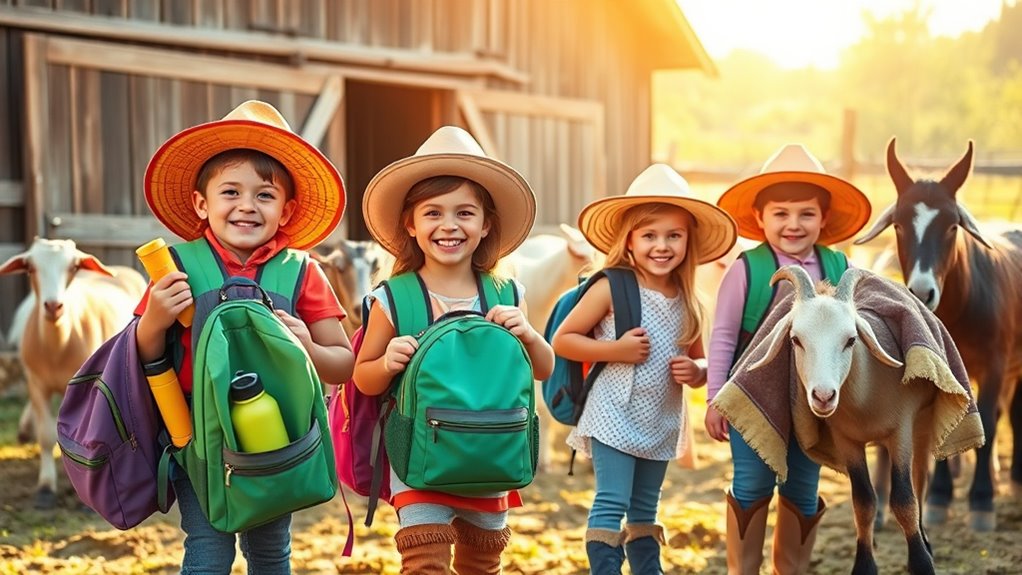
Building your child’s confidence starts with encouraging small, manageable decisions during the camp. You can do this through decision-making exercises that let your child make choices, like selecting their camp activities or packing their bag. Trust-building activities, such as team challenges or sharing stories, help develop their sense of independence. Praise their efforts to reinforce confidence and show that you believe in their abilities. Let them take age-appropriate responsibilities, like managing their belongings or helping with simple chores. As they experience success in these small tasks, they’ll gain the courage to tackle bigger challenges. Incorporating self watering plant pots as a metaphor can also illustrate how small, consistent efforts lead to growth and confidence. Remember, building independence is a gradual process, and your support will make your child feel secure and empowered as they navigate the camp experience.
Frequently Asked Questions
How Can I Help My Child Handle Homesickness During Overnight Farm Camps?
You can help your child handle homesickness by creating routines that give them a sense of stability and familiarity. Encourage independence by letting them make small decisions, boosting their confidence. Talk openly about their feelings and reassure them that homesickness is normal. Remind them of the fun activities ahead, and stay positive. These steps help your child build resilience, making their overnight farm camp experience more enjoyable and less overwhelming.
What Signs Indicate My Child Is Overwhelmed or Anxious at Camp?
You can spot if your child is overwhelmed or anxious by observing behavior cues like withdrawal, clinginess, or irritability. Emotional signals such as frequent tears, nervousness, or complaints about missing home also indicate distress. Pay close attention to changes in their usual routines or social interactions. By noticing these signs early, you can offer reassurance, encourage open communication, and help them feel more secure during their camp experience.
How Do I Ensure My Child Respects Farm Animals and Environment?
To guarantee your child respects farm animals and the environment, teach them about animal kindness and environmental awareness. Show them how to handle animals gently, emphasizing kindness and patience. Explain the importance of protecting nature by staying on designated paths and avoiding littering. Encourage questions and curiosity about the farm’s ecosystem. By modeling respectful behavior yourself, you help your child understand the value of caring for animals and the environment.
What Are the Best Ways to Teach My Child Farm Safety Before Camp?
Imagine your child is exploring a farm and suddenly encounters a curious horse. To teach farm safety, you should emphasize the importance of child supervision around animals and equipment. Practice simple rules like staying calm and listening to instructions. Use role-playing to simulate farm scenarios, helping your child understand risks. Reinforce these lessons regularly so they know how to stay safe, ensuring they’re prepared to enjoy their farm experience responsibly.
How Can I Stay Connected With My Child Without Disrupting Camp Routines?
You can stay connected with your child by using effective communication strategies that respect camp routines. Set clear expectations about when and how you’ll reach out, and establish technology boundaries to avoid disruptions. Sending occasional encouraging messages or photos can boost their confidence, but it’s important to prioritize their independence and the camp’s schedule. This balanced approach helps you stay connected without interfering with their experience.
Conclusion
By following these steps, you’ll set your child up for a memorable farm camp experience filled with growth and adventure. Remember, preparation is the key that open doors to confidence and keeps worries at bay—think of it as planting seeds today for a confident, curious child tomorrow. With the right planning, you’ll watch them thrive amidst nature’s wonders, turning fears into fun and uncertainty into unforgettable memories. Get ready to send them off with confidence and excitement!
